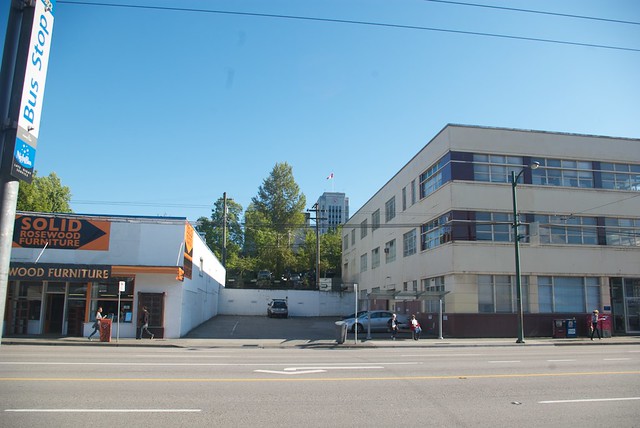As protests in solidarity with #OccupyWallStreet spread across the continent, the “99%’ers” here are beginning to think about what #OccupyVancouver might look like. This is a good thing. Left-wing movements have always known that since capitalism itself is global, resistance to it ought to be global.
For New Yorkers, the most obvious and logical target is Wall Street. Staging a protest camp adjacent Wall Street in downtown New York city is no small feat. New York police are highly militaristic in quashing protests. One can only imagine the intensity of police desire, under pressure from New York power-brokers, to disperse the camp. The bravery of the activists is one of the things from which to draw inspiration.
What does it mean, then, to hold a protest in solidarity with that in New York? In part, it means to be inspired by their courage. That means to take spaces that challenge the real seats of power in our local situation. That may mean taking the steps of the Vancouver Art Gallery, but probably not: the reason protests are often held there is that the space is relatively easy to book. An #OccupyVancouver truly inspired by the original would take a space that is non-bookable, that directly challenges power-brokers.
Throughout Canada, there are many appropriate targets: Bay Street in Toronto, the headquarters of tar sands-related energy corporations in Calgary, and so on. In Vancouver, Coast Salish territories, there are many things to consider. Most importantly, the violence of colonization is felt acutely here, where European settlement began more recently than most other regions of the continent. (Indeed, the word “occupy” is often associated with European colonization of the land; it’s possible that the term, with its multiple meanings, may confuse or distract some from the spirit of #OccupyWallStreet: to stage a collective protest that challenges the 1% who run the capitalist economy).
Arguably the dominant function of Vancouver’s economy is that its housing market acts as a ‘sink’ for global capital accumulation. Investors, most of whom are locally-based, store their extracted wealth in Vancouver’s inflated real-estate market. The inflation of housing prices is managed by a realty oligopoly. This has created an affordability crisis for the working-class. While property-owners rely on the development monopoly to keep their home prices inflated, renters, who constitute the majority, are exploited. The city which most resembles Vancouver in these respects is Hong Kong. Vancouver and Hong Kong rank together as the most unaffordable cities in the world, with the median house price costing more than three times the median household income. As a result, residents are being driven out of their homes, onto the streets, out of the city. In Hong Kong, they have clearly identified the seat of power, and began their own #Occupy-like movement earlier this year. The story may serve as yet more inspiration for those thinking about our own solidarity movement.
Toppling property hegemony: “Down, down with the property tycoons!”
Just this past March 26 2011, Hong Kong activists staged a protest in one of [developer] Li Ka-Shing’s supermarkets “because property developers, not the government, were the ‘real enemies of society'” [1]. As an act of creative civil disobedience, protesters filled shopping carts with items, then stood in line without buying anything, to “paralyse property hegemony for an hour.” One protester said: “We chose ParknShop because it is owned by Mr. Li Ka-shing and we all know Mr. Li is the real boss of Hong Kong…We are not expecting this to change the world, or beat down Mr. Li or the property-developer hegemony. But we want to make it a start of a new satyagraha campaign. We used to protest against the government. But it is no use. We target developers because they are the boss of the government and the real enemy of the society.” Another protester, a recent university graduate, said: “Even if we want to rent a flat, the rents are beyond our reach. It is because the influence of developers is too big.” [1]
Readers may know that Li Ka-Shing’s Concord Pacific bought Vancouver’s massive Expo Lands in 1988, developed Yaletown, and still has long-term plans for 10,000 to 20,000 more high-end condos on North False Creek. Concord Pacific, now run by Terry Hui, remains a major player in Vancouver’s developer oligopoly, with most new housing inventory planned beyond 2013 in Vancouver under its control. Concord’s ‘land bank’ comprises a large portion of Vancouver’s undeveloped lands, including much of False Creek, as well as 58 West Hastings – the site of 2010’s Olympic Tent Village. Concord exerts its power over Vancouver housing prices by developing its ‘land bank’ very slowly as high-end condos. These and similar undeveloped properties and empty condos controlled by Vancouver’s monopolist developers (such as the Aquilini Group, Wall Financial Corp., Concert Properties, Holborn Properties, and marketing ‘coordinator’ Bob Rennie) are reasonable targets for #Occupy. So too is the mostly empty Olympic Village.



